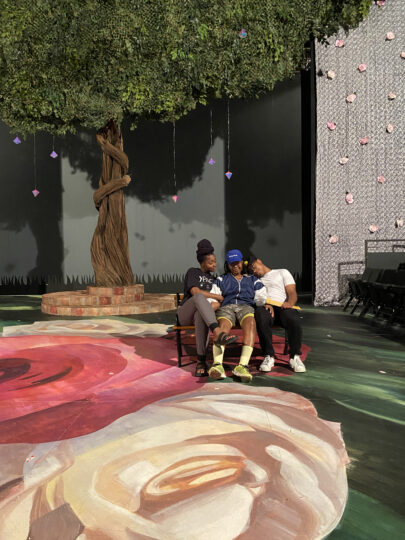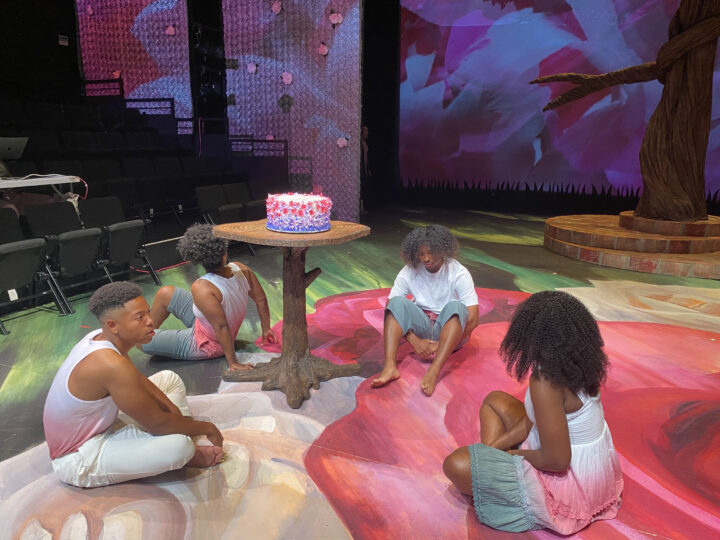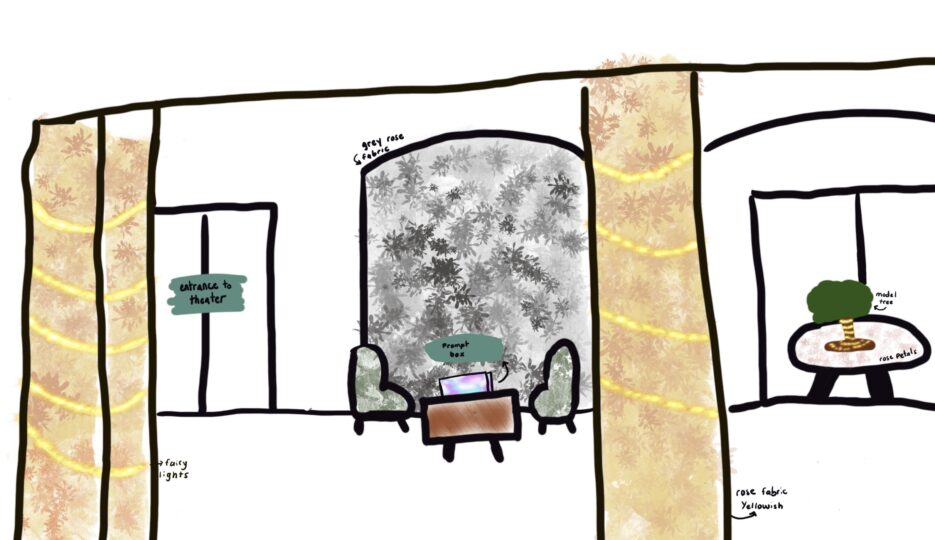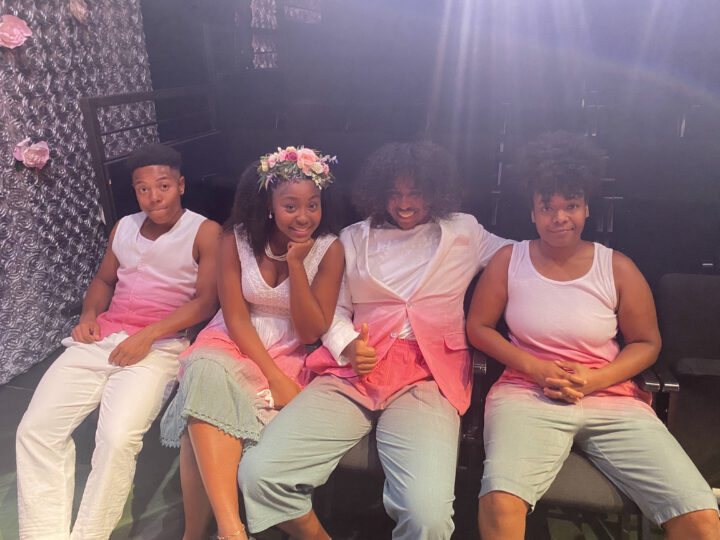JuCoby Johnson’s …but you could’ve held my hand masterfully blends dance, music and poetry in a beautiful exploration of sexuality, gender and Blackness. The lives of the four protagonists play out on stage, immersing the audience in nearly three decades of their hopes, dreams and struggles. While working on this production, it became increasingly important to the creative team that this piece about love and tenderness is seen by audiences who could find themselves reflected on stage in these characters. We spoke with director Braxton Rae, associate director Trinity Gordon and dramaturg/community engagement lead Renita James to learn more about their intended impact of this production, how they’re hoping to engage with audiences beyond Winship and how working on this piece has changed their own lives.
What audiences are you hoping to engage with this play?
Braxton Rae: I’m hoping to engage audiences that are reflected in the play! I’m hoping to invite in younger audiences, Black people and people of color and queer people as well. Ultimately, I hope to invite a variety of marginalized people, or people who thought that stories like theirs were not good enough or important enough to be shown on stage.
Renita James: We are hoping to engage audiences who might be unfamiliar with the Winship Drama Building and the UT Theatre and Dance programs. Our hope is that we are able to engage teens from area high schools, folks from groups on campus who haven’t been to Winship before and community groups who specifically work with young people. We are specifically interested in inviting Black, brown, queer and gender diverse young people to see the show.

What is the significance/impact of reaching those audiences with this particular work?
Renita James: This show specifically focuses on four friends – four Black friends who are grappling with life, growth, connection, transition and so much more. This show is also queer – it queers our ideas of love, connection and relationship. What’s so exciting is that this show doesn’t make those identities the core of the story, but rather an aspect of an individual existence. We watch these characters learn to love and grow into themselves. To that end, it felt important that this work be seen by folks who exist within those identities. We want them to exist within a space, even for 100 minutes, that honors and celebrates those identities.
Braxton Rae: It is so important to me that the art I create and am part of is made to be inclusive to all groups of people. Unfortunately in the theatre, as well as in society, some identities such as being white, cisgendered, heterosexual or male are continually lifted up and made to be the center of attention – so much so that other identities are shut out from the conversation, the theatre, society and history. Because of this, it’s important to me to show diverse audiences that their stories and lives are important. But that is not enough. Because of the harmful history of the theatre and of society we need to make sure we are inviting these groups of people into the spaces of the theatre that eliminates barriers to access and makes everyone feel welcome.
How is the team working to connect audiences with this piece? What do you hope they take away from the work?

Trinity Gordon: We are hoping to connect audiences with this piece by inviting them in and encouraging them that this show is a safe space to explore their identity, sexuality and growth as a person. I hope audience members who see this show are enamored by the softness and complexities of what it means to love and care for yourself, friends, family, etc. I challenge audiences to investigate their definition of love before, during and after seeing this piece.
Renita James: We are reaching out to anyone and everyone we can think of who might relate to the characters in this show. We are also working on finding ways to engage anyone who walks through the Winship lobby. We’ll have letter writing stations on the tables in the lobby that will give folks an opportunity to engage with some of the themes of the work in a more meaningful way. It was really important to me that anyone, whether you see the show or not, has the opportunity to explore the themes of this show.
I hope audiences leave loving themselves and the world around them a little bit more. I hope they feel that they deserve to exist as their most authentic self and recognize that though sometimes the road to that most authentic self is messy, it’s all a growth process. I also hope they recognize all the love that exists in their lives. We put so much emphasis as a society on romantic love that we sometimes undervalue all the other ways of loving and being loved – they are all so important.

After working closely with this show, what do you wish you could tell your younger self?
Braxton Rae: It’s funny, I actually think about my younger self a lot in relation to my older self. I’ll get upset because I’ve crafted myself into the person I think I needed when I was younger, but that doesn’t change the fact that I didn’t have that person when I needed them. So the first thing I would do is tell my current and older selves to breathe because they can’t change the past by being upset about it. Then, I think I’d do my best to throw as much love on to my younger self as possible. I just feel so sad for that kid because I think he needed love and never quite received it.
Renita James: I would tell my younger self not to shrink away into the shadows. That she is a joy to be around (people aren’t lying) and that she is capable of so much. That it is absolutely okay to be queer and free and want short hair and lean into the more “masculine” side of things. She’s not broken, she is brilliant. She’s a gift.
Trinity Gordon: After working with this show, I wish I could tell my younger self that love is messy, love is calm and love is a garden waiting to bloom, but you have to water it. You have to tend to it and continue to care for it daily.
—
Join Texas Theatre and Dance for …but you could’ve held my hand and see these powerful elements come together in a night of moving, loving, immersive live theatre.
…but you could’ve held my hand
October 6-16, 2022
Oscar G. Brockett Theatre
TICKETS

Written by Stefan Ormsby-Peacock.

